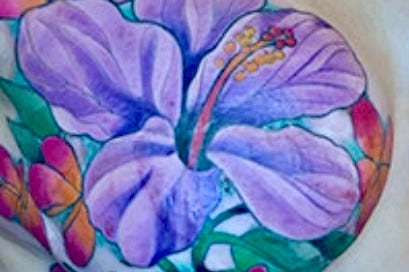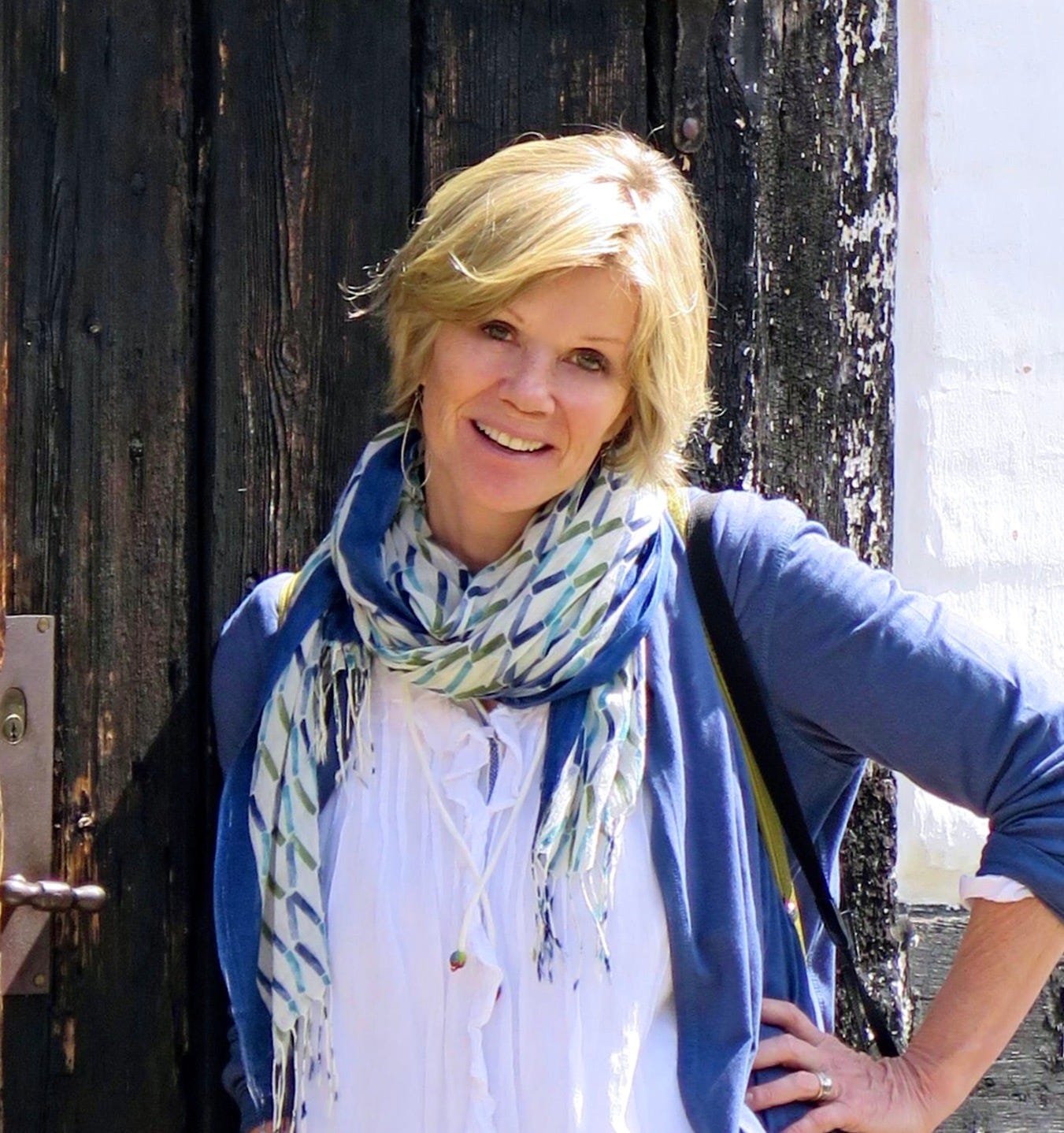Knowing my sister had liked and respected him, Mom asked Martin to say a few words at the memorial service she held for Karen the month after she died, which he graciously agreed to do. In addition to writing his own eulogy for her, Martin encouraged me to speak as well.
I hesitated at first, but he persisted. It was easy and cathartic for me to write about Karen. But saying the words out loud, knowing I’d never see her again and that my treasury of stories was now of a finite quantity that could never be added to – well, I wasn’t sure I could manage that without breaking down in front of others.
Martin coached me, suggesting I add in a little humor where possible, knowing the gathering of mourners would appreciate the opportunity to smile or laugh. He showed me how to type my words out double-spaced, in all caps with pauses and other directions written in to make it easier to read them aloud to an audience.
And so, I wrote about the London years and our vintage clothing shopping spree in Georgetown after seeing The Last Metro. I wrote about the afternoon I watched her buy the large painting of flowers at the Torpedo Factory and a few other anecdotes that I felt showcased her spirit and personality. He had me read what I’d written out loud to him over and over, coaching me on my pacing until both of us felt I was as ready as I would ever be to do the unthinkable, the unimaginable – to speak at my sister’s memorial service.
We flew back down to Sarasota together. My mother had made arrangements for a service at a small Lutheran church near where she lived. Walking in, I noticed there were cheerful little plastic flowers along the sidewalk. An avid gardener, Karen would have hated fake flowers, I thought. I hated them on her behalf. Then I reminded myself, this service and its location in a church wasn’t really about Karen; it was for those she left behind, especially our mother. Details like that simply didn’t matter.
I remember very little of the actual service. Martin thoughtfully made a recording of me speaking and gave me the tapes, but I’ve never been able to listen to them.
One of the most meaningful tributes to Karen came after the memorial service, back at the documentary workshop. And it came from Bertch, our freelance gaffer or chief lighting guy, the head electrician on most of our shoots, the guy in charge of the layout and design of the lighting. Bertch was a very sweet guy, tall, a bit shy and a bit awkward, often blinking at the world and those around him from behind his spectacles. He was quick to laugh at a joke and fiercely loyal to those he cared about.
Bertch was interested in how things worked and how they were put together, useful attributes for a head electrician. He freely admitted to having ADHD, attention deficit disorder. He’d tell us the story of how he’d disassembled his Volvo in order to fix something, but he never actually got around to doing that. Month after month, the Volvo lay in parts around his living room like weird metal steampunk furniture. Rather than put it all back together, he eventually decided it would be easier to buy a second, secondhand car.
In addition to working on our documentary shoots, one of Bertch’s main gigs was weddings. A Washington Post Lifestyle article once described him as spending his weekends ‘trying to make electronic sense of other people's happy occasions.’ That was Bertch in a nutshell: on the sidelines, in the shadows, sweating the details, and wanting the best for others.
We looked out for one another in small, and not so small ways. Ten years older than me, he sometimes played the role of a big brother. Once, a nearby restaurant owner was rude to me during a meal everyone from the documentary workshop was enjoying together. Martin ignored this uncomfortable situation, the words that silenced everyone at our table. It was Bertch who, as we left the restaurant, wordlessly put his arm around me and held me close as we walked the few blocks back to work.
Another time, we had a shoot in the city on a miserable weather day, an interview with a Catholic Bishop at his residence. Bertch seemed unsettled when he arrived. Coming in through the front door, he thoughtlessly, and uncharacteristically, threw his wet slicker down on some very nice wooden furniture. Concerned with possible marks, I retrieved his wet things, hung them somewhere else and mopped up the chairs so he wouldn’t get in trouble. Then I offered to do a drinks run for the crew. I bought containers of juice for everyone except Bertch. Having read that caffeine can calm down some ADHD traits, I brought him two cokes. It worked a charm. He was fine halfway through the first bottle.
Not long after Karen died, I came into work and found a card on my desk along with a pre-paid entry form for the 10th anniversary Susan G Komen 5K Race for the Cure in Washington, DC. It was from Bertch
Even though he knew I wasn’t a runner, this was a touching gift from someone who didn’t know how to console me. Although he never said or wrote this, I think what he wanted to say in his sweet, slightly awkward way, was – If we support the Race for the Cure, maybe you won’t get breast cancer and die like your sister. That weekend, I bought a pair of running shoes and began training to run in memory of my sister. I had eight weeks to prepare.
On the 5th of June, participants gathered early in the morning for a sunrise breakfast on the grounds of the Washington Monument featuring a ten-star salute to survivors with Al and Tipper Gore. After, the survivors, some sporting pink bandanas over their bald heads, and their families ran through the streets of Washington DC together. Seeing them made me sad. In a crowd of about 50,000 – I was running alone.
I ran for my sister. And I ran with appreciation for Bertch.
He also gave me a copy of a book titled, “Hilary and Jackie: The True Story of Two Sisters Who Shared a Passion, a Madness and a Man.”
Written by Hilary du Pré, it was the story of her sister, Jacqueline and her life as an international cellist, her marriage to conductor Daniel Barenboim, and her early diagnosis with multiple sclerosis. It was also the somewhat shocking story that Jacqueline shared her husband with her sister.
Apart from being a book about sisters, it had nothing to do with me and Karen. But that was how Bertch’s mind worked, and I loved him for it.
In the years to come, two more documentary films will come to my rescue, providing me with a path and vision for how I could navigate the wake of Karen’s death in a positive way.
Whereas Final Blessing had helped prepare me for a pending loss, these films will give me opportunities to go beyond that loss to help others – and in a more impactful way than running through a city in the early morning hours. Working with these films, I will be able to reach potentially tens of thousands of women, if not more, with scientific information and true stories. As a personal bonus, the transformative art of tattooing will be involved.
But as I crossed the finish line, somewhere in the middle of the pack, these films are still way off in the future. They haven’t even been made yet. The filmmakers have not yet had the life experiences that will inspire them to create a documentary film on the topic. One filmmaker’s wife has yet to discover she has breast cancer. Another filmmaker has yet to read an article, which has yet to be written, that will make him think of the grandmother he lost to breast cancer, understand how her doctors failed her, and then decide to do something about it.
These filmmakers have not yet raised the funding needed, nor picked up their cameras, nor assembled a team to help them make these films. And at this moment, neither of them know who I am, nor do I know them.
But we are already destined to be connected. In future years, our paths will cross as we come together on a topic painfully close to all of our hearts as the three of us, each in our own way, find a measure of healing by helping others mitigate their own suffering and perhaps even heal.
In the meantime, there was another unexpected plot twist to deal with, a life-changing shocker that happened just a few weeks after my sister’s memorial service and it needed my immediate attention.
[screen grab above from the film Full Circle by filmmaker Patrick Norman]
Kristin Fellows is a published writer, world traveler, and a well-seasoned documentary film consultant. When not writing, Kristin can often be found listening to someone’s story or behind the lens of one of her cameras.
More about Kristin @ kristinfellowswriter.com






You made me cry..again. But it's worth it to read your beautiful prose. I love how you foreshadowed what's coming. I spoke at Bitty's service. Her husband asked if Meg or I would speak about her as a sister. I'm so glad I did. I felt like I got to talk to her one last time.
There are few words that console. Presence does a better job. My hope is you will find a way to listen to the tape. What you say, who you are matters, and you have a gift with words, scenes and senses. Plus your goodness, kindness, love and compassion come through like a shining light.
Thanks again, Kristin.